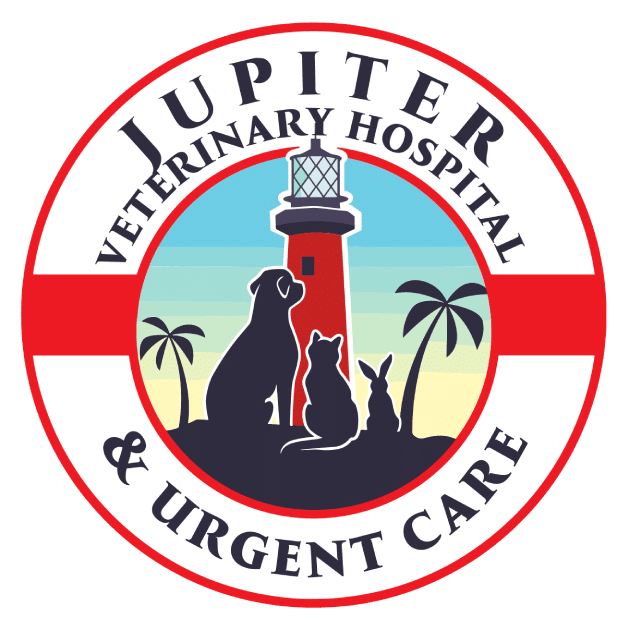Pets are naturally curious, and sometimes that curiosity leads them into dangerous situations. Poisoning is a serious risk that can happen at any time, whether from household products, toxic foods, or plants. March is Pet Poison Prevention Month, a reminder to pet owners to recognize potential hazards, take preventive measures, and know what to do in case of an emergency. At Jupiter Veterinary Hospital & Urgent Care, we provide urgent and emergency care during business hours and are here to help if your pet needs treatment for poisoning.
Signs of Poisoning in Pets
Symptoms of poisoning can vary depending on the type of toxin, but common signs to watch for include:
- Vomiting and Diarrhea – Often the first signs of ingestion of a toxic substance
- Excessive Drooling or Pawing at the Mouth – Indicates possible irritation from chemicals or toxic plants
- Lethargy or Weakness – A sudden lack of energy may signal poisoning
- Tremors, Seizures, or Difficulty Walking – Can indicate neurological effects from toxins
- Difficulty Breathing or Coughing – Some poisons affect the respiratory system
- Increased Thirst and Urination – May indicate damage to the kidneys from toxic ingestion
If you notice these symptoms and suspect your pet has been poisoned, contact a pet poison control hotline immediately for expert guidance.
Common Household Poisons
Many everyday household items, foods, and plants can be toxic to pets. Some of the most common toxins include:
- Human Medications – Over-the-counter pain relievers, cold medicine, antidepressants, and vitamins
- Toxic Foods – Chocolate, xylitol (found in sugar-free gum and baked goods), grapes, onions, garlic, alcohol, caffeine, and raisins
- Poisonous Plants – Lilies (especially toxic to cats), sago palms, azaleas, and ivy
- Household Chemicals – Bleach, antifreeze, rodenticides, insecticides, and fertilizers
- Essential Oils and Diffusers – Some essential oils, including tea tree and eucalyptus, can be toxic to pets
For a complete list of toxic substances, visit the ASPCA’s Animal Poison Control Center website.
What to Do If Your Pet is Poisoned
If you suspect your pet has ingested something toxic, act quickly:
- Call a pet poison control hotline immediately. The ASPCA Animal Poison Control Center (888-426-4435) or the Pet Poison Helpline (855-764-7661) can assess the risk and provide expert guidance.
- Do not induce vomiting unless instructed. Some toxins can cause more harm if vomited. Always follow the poison control expert’s recommendations.
- Seek veterinary care immediately. Jupiter Veterinary Hospital & Urgent Care provides emergency treatment for poisoning cases during business hours. If your pet requires immediate attention, bring them in for evaluation and treatment.
- Bring any packaging or labels of the substance your pet may have ingested to help veterinarians determine the best course of treatment.
Preventing Pet Poisoning
Taking precautions can help reduce the risk of accidental poisoning. Here are a few ways to keep your pet safe:
- Store Medications Securely – Keep all human and pet medications out of reach, and never give your pet human medicine unless prescribed by a veterinarian
- Be Mindful of Food and Treats – Keep toxic foods away from pets, and check ingredient labels carefully
- Use Pet-Safe Cleaning Products – Store household cleaners securely and opt for non-toxic alternatives
- Check Your Houseplants – Before bringing new plants into your home or garden, confirm they are non-toxic to pets
Emergency Care When Your Pet Needs It
At Jupiter Veterinary Hospital & Urgent Care, we provide urgent and emergency care during business hours and are equipped to handle poisoning cases. If you suspect your pet has ingested something toxic, call poison control first for guidance, then bring your pet in for treatment if needed.
If poisoning occurs outside of our business hours, seek treatment at the nearest 24/7 emergency hospital.
For non-urgent pet health concerns, Jupiter Veterinary Hospital & Urgent Care is here to help. Contact us for routine care, wellness check-ups, and preventive health measures.










